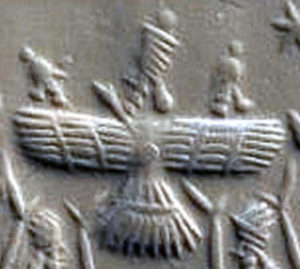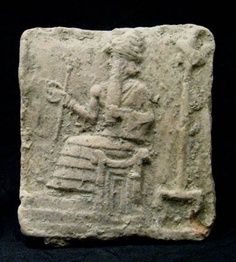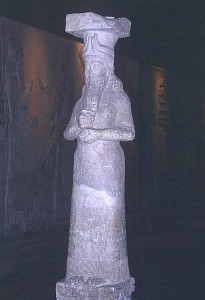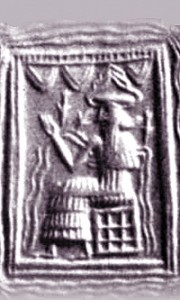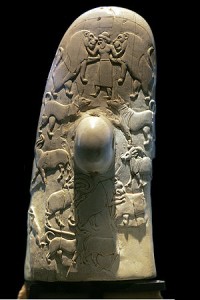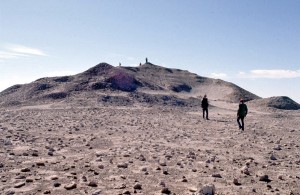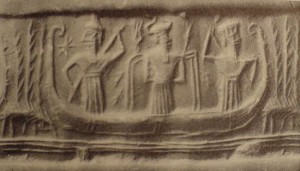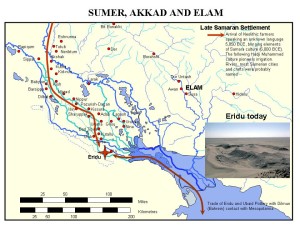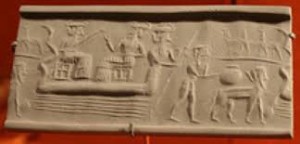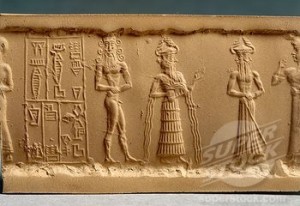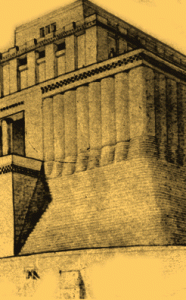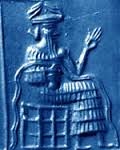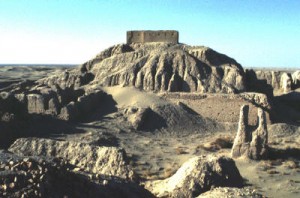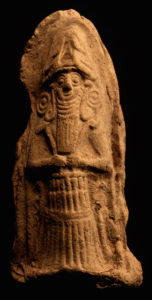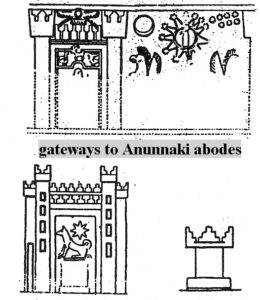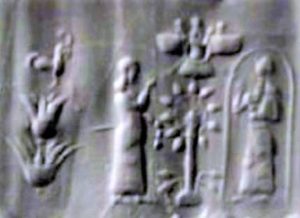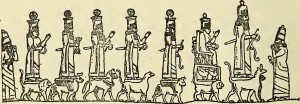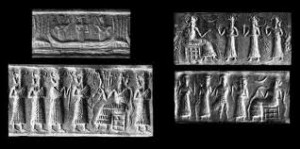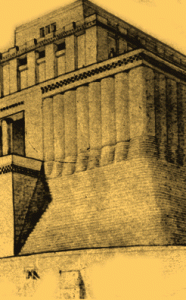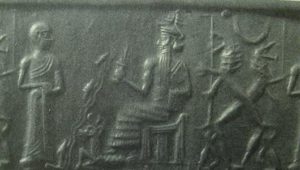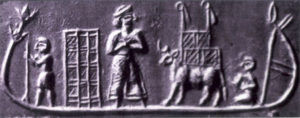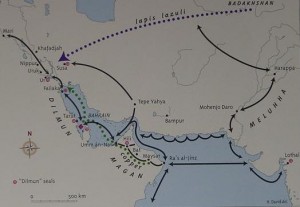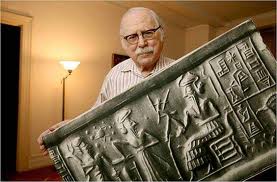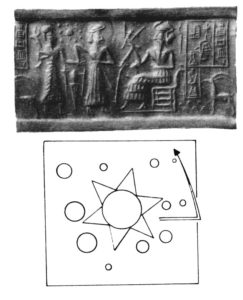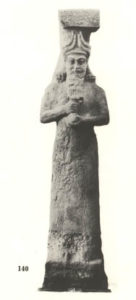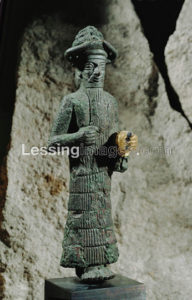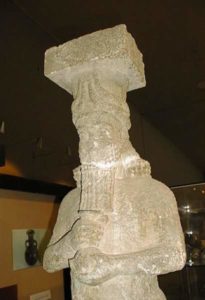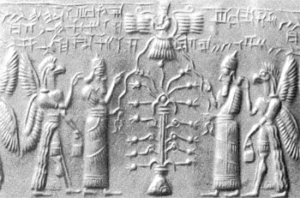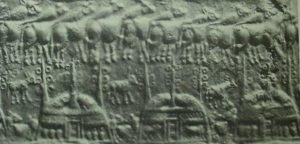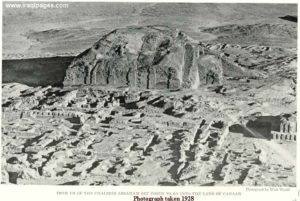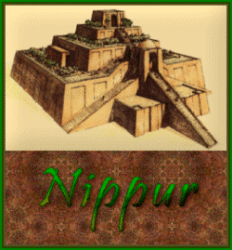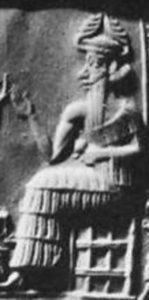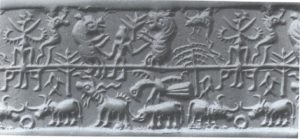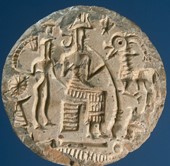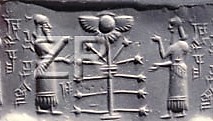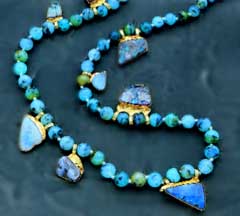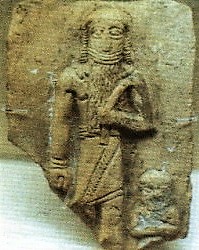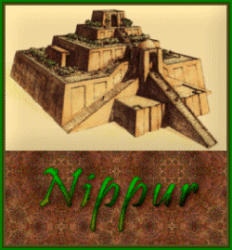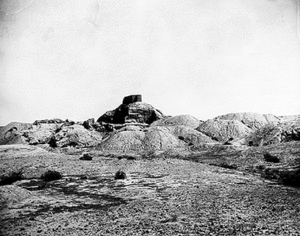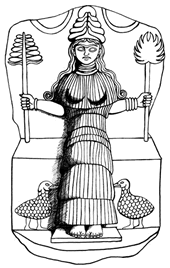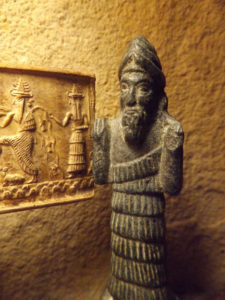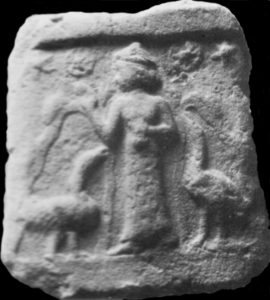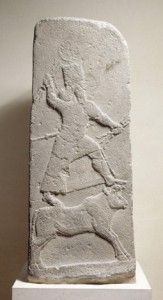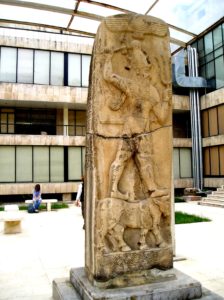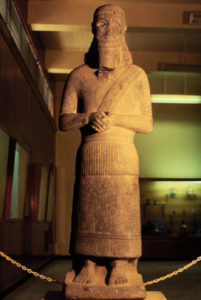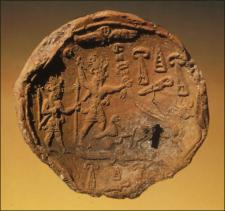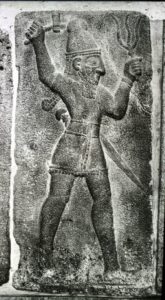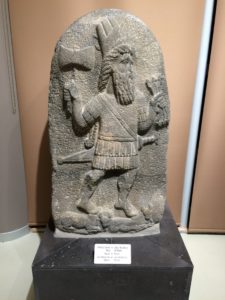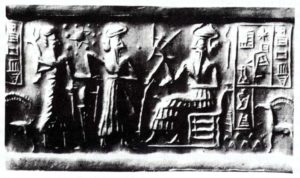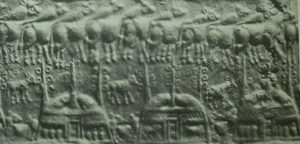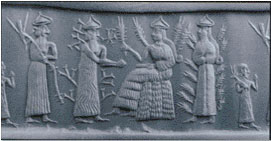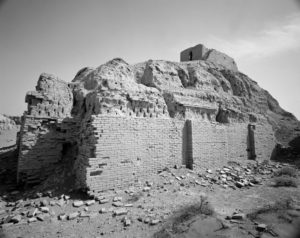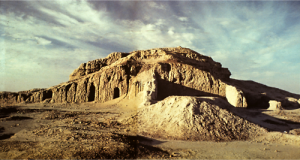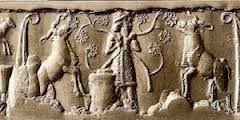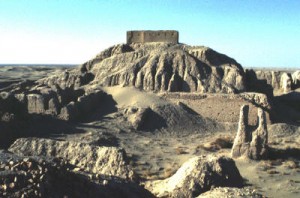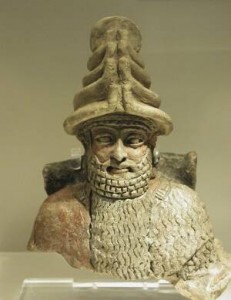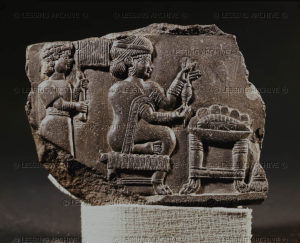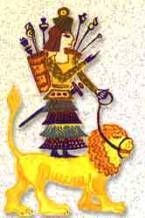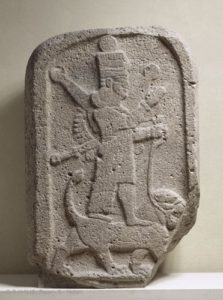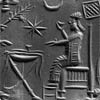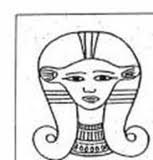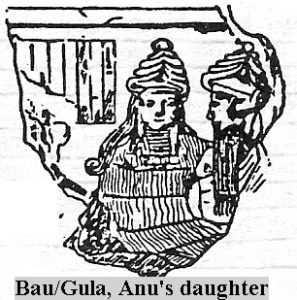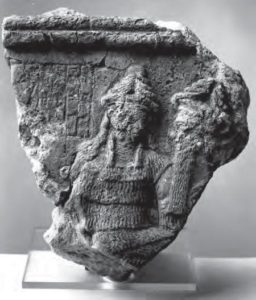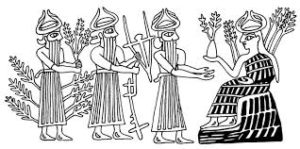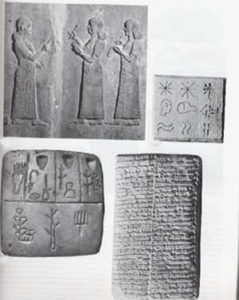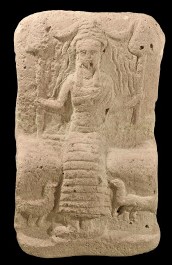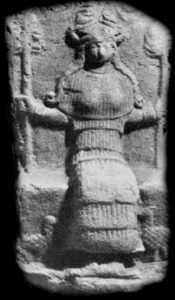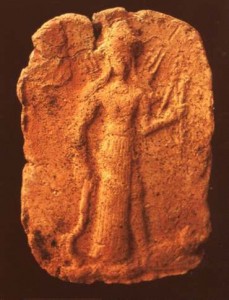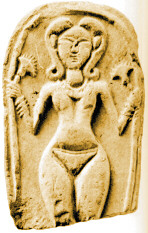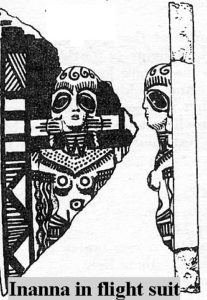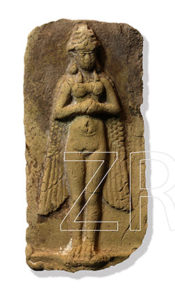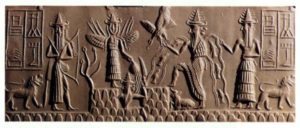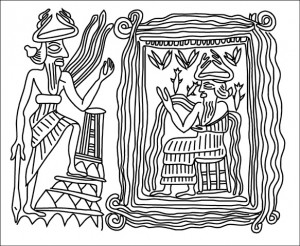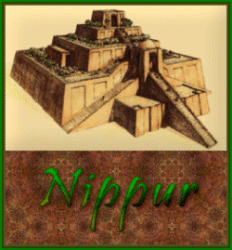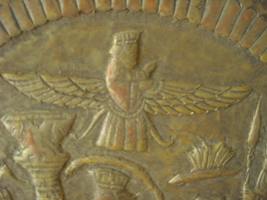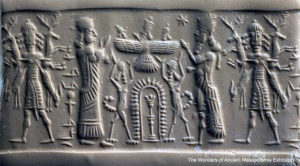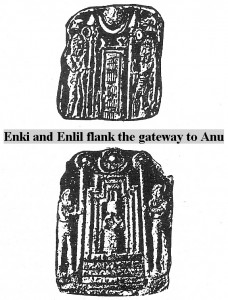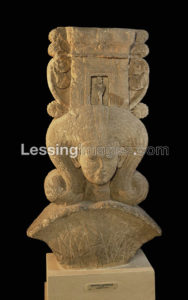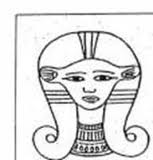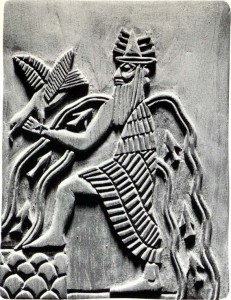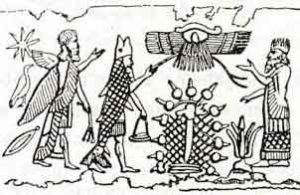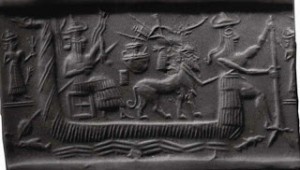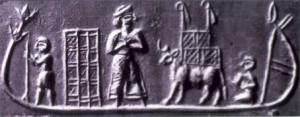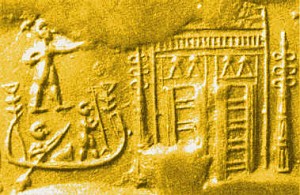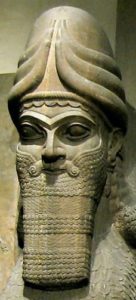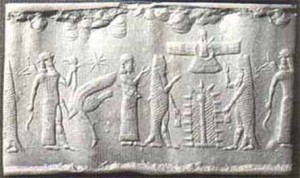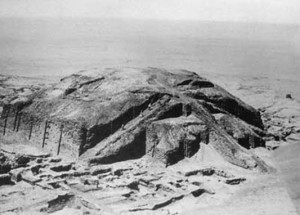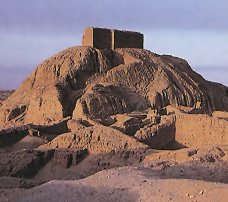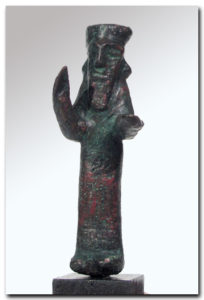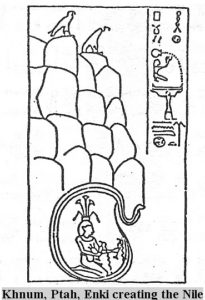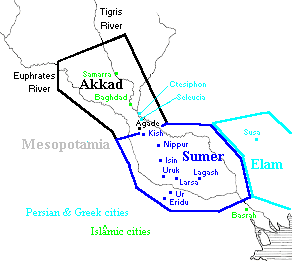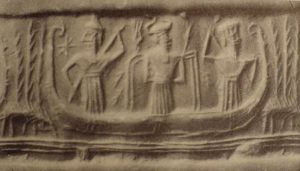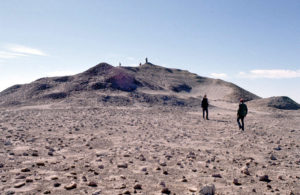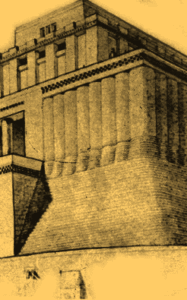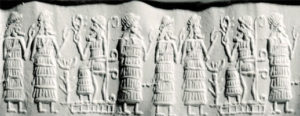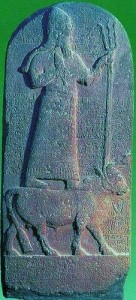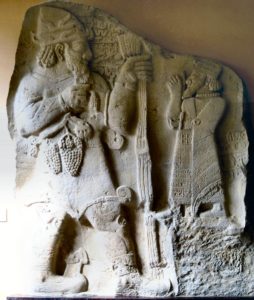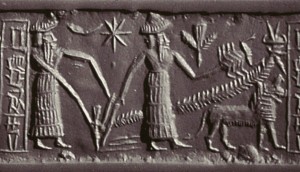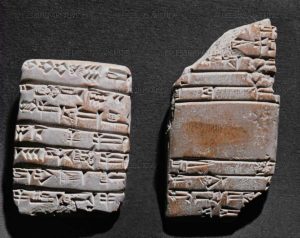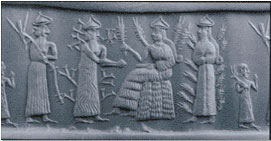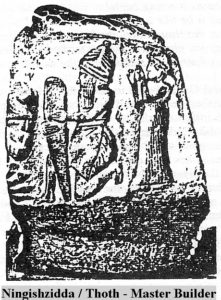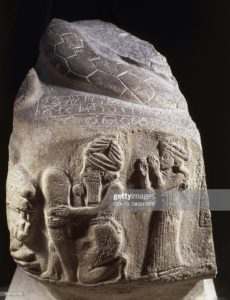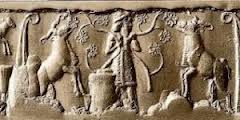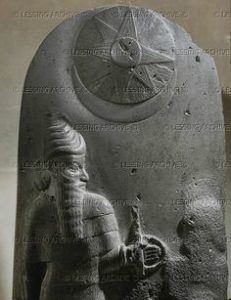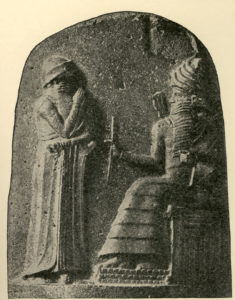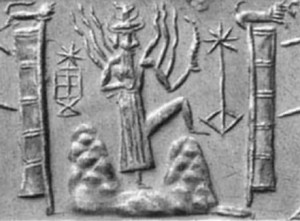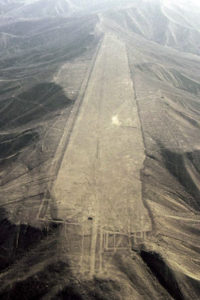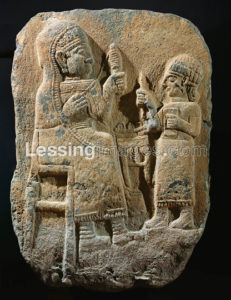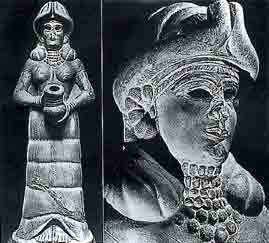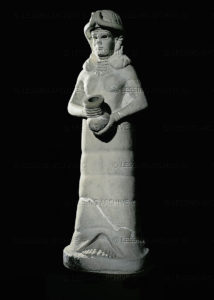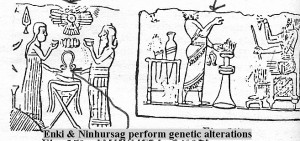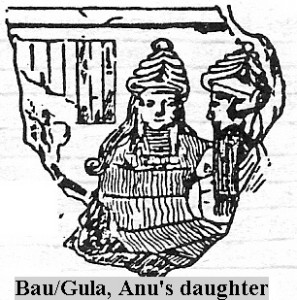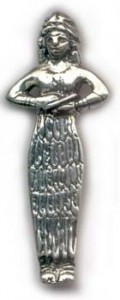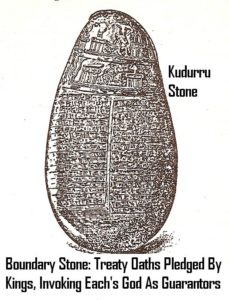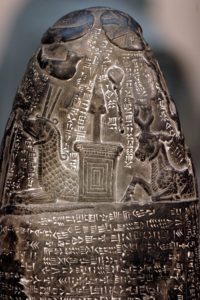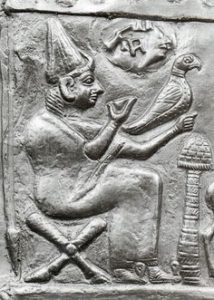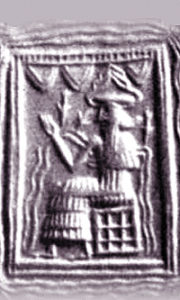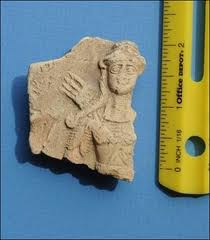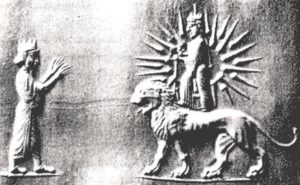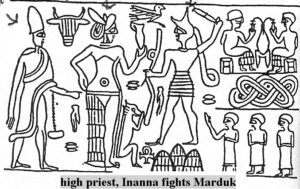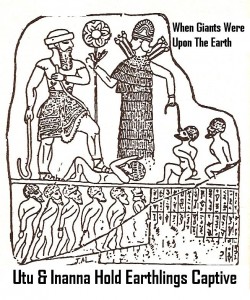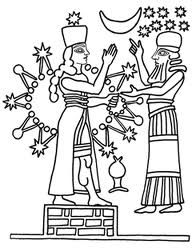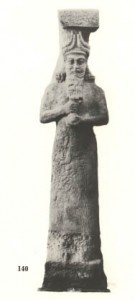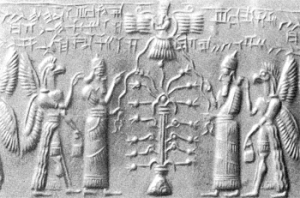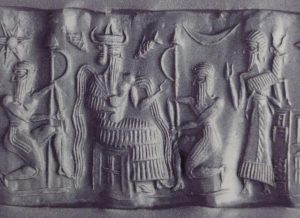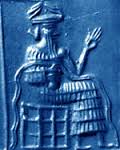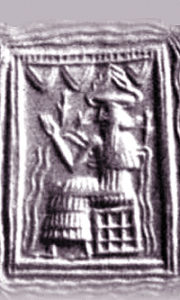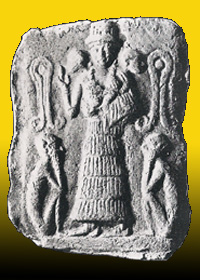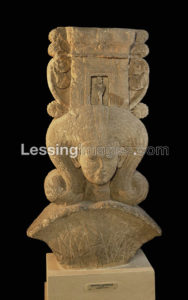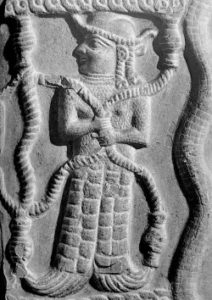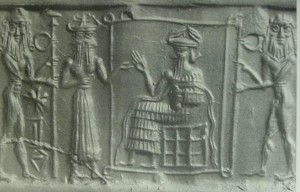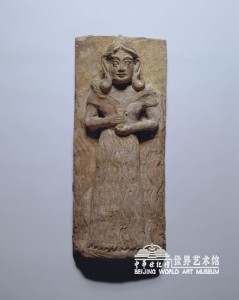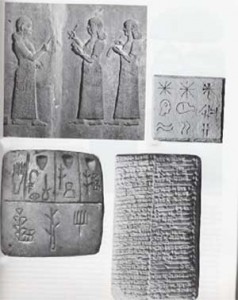SEE SITCHIN’S EARTH CHRONICLES, ETC.:
(Texts: All Artifacts, Color Coding, & Writings in Bold Type With Italics Inside Parenthesis, are Added by Editor R. Brown, not the Authors, Translators, or Publishers!)
(gods in blue …mixed-breed demigods in teal…)
“My father, ruler above and below,
made my features blaze above and below …”
“My great brother, ruler of all the lands,
gathered all the me together, placed the me in my hands.
From the Ekur (Enlil’s temple in Nippur), house of Enlil,
I passed on the arts and crafts to my Abzu, Eridu…
I am the true offspring, sprung from the wild ox.
I am a leading son of An (Anu).
I am the great storm the breaks over the ‘Great Below’:
I am the great lord over the land.
I am the first among the rulers.
I am the father of all the lands.
I am the big brother of the gods, the hegal is perfected in me.
I am the seal-keeper above and below.
I am cunning and wise in the lands.
I am the one who directs justice alongside An (Anu),
the king (of planet Nibiru & Earth Colony), on the dais of An.
I am the one who having gazed upon the Kur, decrees the fates alongside Enlil:
he has placed in my hands the decreeing of fates at the place where the sun rises.
I am the one Nintu (Ninhursag) really cares for:
I am the one Ninhursag gave a good name.
I am the leader of the Anunna-gods (Anunnaki).
I am the one born a leading son of An …”
Enki, king of the Abzu, celebrates his own magnificence:
“I am lord. I am the one whose word endures. I am eternal.
At my command stalls were built, sheepfolds ringed about:
When it approached the above, the hegal rain poured down from above.
When it approached the below, there was a high carp-flood.
When it approached the green fields,the heaps and piles of grain stacked high at my word.
I built my house, the shrine, in a pure place, gave it a good name.
I built my Abzu, the shrine, in…decreed for it a good fate.
My house – its shade stretches over the snake-marsh.
My house – there the suhurmas-fish wave their beards among the honey-plants,
its gud-fish wave their tails for me among the small gizi-reeds,
its flock of birds keep chirping in their nests …”
“When I approached Earth, there was much flooding.
When I neared its green meadows, heaps and mounds were piled up at my command.
In a pure place I built my house, an appropriate name I gave it …”
“The gods had clasped hands together,
Had cast lots and had divided.
Anu then went up to Heaven (home planet Nibiru);
To Enlil (Earth Colony Commander) the Earth was made subject.
The seas, enclosed as with a loop,
They had given to Enki, the Prince (son to King Anu) of Earth …”
“The seas they had given to Enki, the Prince of the Earth …”
Another version, Akkadian states:
“The gods clasped their hands together, then cast lots and divided:
Anu to heaven went up;
To Enlil the Earth was made subject;
That which the sea as a loop encloses, they gave to the prince Enki.
To the Abzu Enki went down, assumed the rulership of the Abzu …”
Enki was not happy with the division of power, the reign of gods over territory. Anu, the god over all, went back to Nibiru. Enlil was given domain over the Earth. Enki was to be god of the seas. Enki pleas to his father Anu for a better deal.
“My father, the king of the universe, brought me forth in the universe….
I am the fecund seed,
Engendered by the Great Wild Bull;
I am the first born son of Anu.
I am the Great Brother of the gods….
I am he who has been born as the first son of the divine Anu …”
Anu stated:
” My son Enki has made his temple….
grow from the ground like a mountain …”
“After the water of creation had ben decreed,
After the name hegal (abundance) born in heaven,
Like plant and herb had clothed the land,
The lord of the abyss, the king Enki,
Enki the Lord who decrees the fates,
Built his house of silver and lapis lazuli;
Its silver and lapis lazuli, like sparkling light,
The father fashioned fittingly in the abyss.
The creatures of bright countenances and wise, coming forth from the abyss,
Stood all about the lord Nudimmud (Enki);
The pure house he built
He ornamented it greatly with gold,
In Eridu he built the house of water-bank,
Its brickwork, word-uttering, advice-giving,
Its… like an ox roaring,
The house of Enki, the oracles uttering.
When Enki rises, the fish…. rise,
The abyss stands in wonder,
In the sea joy enters,
Fear comes over the deep,
Terror holds the exalted river,
The Euphrates, the South Wind lifts it in waves.
Enki in the shrine Nippur,
Gives his brother Enlil bread to eat,
In the first place he seated Anu (the Skyfather),
Next to Anu he seated Enlil,
Nintu he seated at the big side,
The Anunnaki seated themselves one after the other. …”
Enlil says to the Anunnaki:
” Ye great gods who are standing about,
My brother has built a house, the king Enki;
Eridu, like a mountain, he has raised up from the earth,
In a good place he has built it.
Eridu, the clean place, where none may enter,
The house built of silver, adorned with lapis lazuli,
The house directed by the seven lyre-songs given over to incantation,
With pure songs….
The abyss, the shrine of the goodness of Enki,
befitting the divine decrees,
Eridu, the pure house having been built,
O Enki, praise! …”
“He (Enlil) perfected the procedures, the divine ordinances;
Established five cities in perfect places,
Called them by name,
Laid them out as centers.
The first of these cities, Eridu,
He granted to Nudimmud (Enki), the pioneer …”
Enki and Ninhursag,…the Sumerian tale relates that Enki crossed the marshy lakes that separated Egypt and the Sinai peninsula and came unto the lonely Ninhursag…:
“To the one who is alone,
To the Lady of Life, mistress of the land,
Enki came unto the wise Lady of Life.
He causes his phallus to water the dikes;
He causes his phallus to submerge the reeds…
He poured his semen into the great lady of the Anunnaki,
poured the semen into the womb of Ninhursag;
She took the semen into her womb, the semen of Enki …”
Enki’s real intention was to obtain a son by his half-sister, but the offspring was a daughter. Enki then made love to the daughter as she became “young and fair”, and then the grand-daughter.
Telling of Enki having sex with the daughter he had with sister Ninhursag, a tablet states:
“He embraced her, he kissed her;
Enki poured the semen into the womb …”
Enki had another daughter. He then went after his granddaughter to bear him an heir. She too had a daughter. In order to stop Enki’s behavior, Ninhursag put a spell on him where he became deathly ill after eating some plants.
“Until he is dead,
I shall not look upon him
with the ‘Eye of Life’ …”
She later removed the curse.
“Ninhursag seated Enki by her vulva and asked:
‘My brother, what hurts thee?’ …”
After she cured his body part by part, Enki proposed that the two of them as masters of Egypt and the Sinai assign tasks, spouses, and territories to the eight young gods:
“Let Abu be the master of plants;
Let Nintulla be the lord of Magan (Egypt);
Let Ninsutu marry Ninazu;
Let Ninkashi (Ninkasi) be she who sates the thirsts (beer goddess);
Let Nazi marry Nindara;
Let Azimua marry Ningishzidda;
Let Nintu be the queen of the months;
Let Enshag be the lord of Tilmun (“Land of the Missiles”)! …”
Ptah (Enki) followed up the bringing forth of these gods by assigning abodes and territories to them:
“After he had formed the gods, he made cities, established districts,
put the gods in their sacred abodes;
he built their shrines and established their offerings …”
All that he did
“to make rejoice the heart of the Mistress of Life …”
one text has Enki as Ninlil’s father & Ningikuga as her mother:
“Mother Ningikuga would nod, but not say a word.
She, the wise Goddess of Reeds, Sovereign of the Marshlands,
Enki’s dear friend, and the diligent Weaver
who had brought to humankind the art of binding reeds
for the first ruts and temples of the land,
knew what the maiden’s natural shyness could not,
would not yet reveal: Ningal had fallen in love with Nanna.
Thus Ningikuga watched over Ningal,
respected the girl’s silence. Soon, the Wise Friend of Enki knew,
Ningal would come into her full power as a woman
and young goddess of the Holy House. …”
Enki was hustled by his great-niece, Inanna during a dinner date arranged by her. Enki instructed his house servant to the preparations: She later stole from him, while he was drunk, 100 “Tablets of Destinies”.
“Come my housemaster Isimud, hear my instructions;
a word I shall say to you, heed my words:
The maiden, all alone, has directed her step to the Abzu…
Have the maiden enter the Abzu of Eridu,
Give her to eat barley cakes with butter,
Pour for her cold water that freshens the heart,
Give her to drink beer…. …”
Enki filled the Tigris River with “life-giving waters”. He states that he:
“directed the plow and the yoke…
opened the holy furrows…
built the stalls…
erected sheepfolds …”
Pyramid Wars
On one side was Ninurta, Adad, and soon joined by Sin, and then later on by Inanna / Ishtar.
On the opposing side are listed Nergal, a god referred as “Mighty, lofty One”—Ra / Marduk—and the “God of two Great Houses” (the two Great Pyramids of Giza), who had tried to escape, camouflaged in a ram’s skin.
Ninhursag took the surrender offer of Enki’s to Enlil. She met him in the presence of Adad (while Ninurta remained on the battlefield). “O hear my prayers!” she begged the two gods…
“Presenting himself there, to the Mother,
Adad thus said:
‘We are expecting victory.
The enemy forces are beaten.
The trembling of the land he could not withstand’ …”
Adad said, let her call discussions on the basis that the Enlilites are about to win:
“Get up and go—talk to the enemy.
Let him attend the discussions
so that the attack be withdrawn …”
Enlil, in less forceful language, supported the suggestion:
“Enlil opened his mouth;
In the assembly of the gods he said:
‘Whereas Anu at the mountain the gods assembled,
warfare to discourage, peace to bring,
and has dispatched the Mother of the Gods
to entreat with me–
Let the Mother of the Gods be an emissary …”
Turning to his sister, he said in a conciliatory vein:
“Go, appease my brother!
Raise unto him a hand for Life;
From his barred doorway,
let him come out! …”
Doing as suggested, Ninhursag
“his brother went to fetch,
put her prayers before the god …”
She assured him that his safety, and that of his sons, was assured:
“by the stars she gave a sign …”
As Enki hesitated she said to him tenderly:
“Come, let me lead you out …”
“And as he did, he gave her his hand …”
She conducted him and other defenders of the Great Pyramid to the Harsag, her abode. Ninurta and his warriors watched…
We learn from the continuing ancient chronicle that Ninhursag first went with her idea of stopping the fighting and convening a peace conference to Enlil’s camp.
The Enlilite’s first reaction…was to accuse her of giving aid and comfort to the “demons”.” Ninhursag denied the accusation:
“My House is pure, …”
she answered. But a god whose identity is unclear challenged her sarcastically:
“Is the House which is loftier and brightest of all …”
the Great Pyramid—also “pure”?
“Of that I cannot speak …”
Ninhursag answered;
“its brilliance Gibil is soldiering …”
…a ceremony of symbolic baptism making Ninhursag welcome again in Mesopotamia. Enlil touched her with his “bright scepter,” and the
“power of her was not overthrown …”
But then Enlil agreed saying to her:
“Go, appease my brother …”
Ninhursag performed a symbolic ceremony of her own. She lighted seven fires, one each for the gathered gods: Enki and his two sons: Enlil and his three sons (Ninurta, Adad, and Sin). She uttered an incantation as she lit each fire:
“A firery offering to Enlil of Nippur…
to Ninurta…
to Adad…
to Enki, coming from the Abzu…
to Nergal, coming from Meslam …”
By nightfall the place was ablaze:
“as sunlight was the great light set off by the goddess …”
Ninhursag then appealed to the wisdom of the gods and extolled the virtues of peace:
“Mighty are the fruits of the wise god;
the great divine river to his vegetation shall come…
`its overflowing will make (the land) like a garden of god …”
text 1
“I Sing the Song of the Mother of the Gods …”
“Enki addressed to Enlil words of lauding:
‘O one who is foremost among the brothers,
Bull of Heaven, who the fate of Mankind holds:
In my lands, desolation is wide spread;
All the dwellings are filled with sorrow
by your attacks …”
…the territorial disputes be brought to and end and the lands rightfully belonging to the Enlilites and the people of the line of Shem be vacated by the Enkites. Enki agreed to cede forever these territories:
“I will grant thee the rulers position
in the gods’ Restricted Zone;
The Radiant Place, in thy hand I will entrust! …”
In so ceding the Restricted Zone (the Sinai peninsula with its spaceport) and the Radiant Place (the site of Mission Control Center, the future Jerusalem) Enki had a firm condition…the sovereignty of Enki and his descendants over the Giza complex had to recognized for all time.
Enlil agreed but…sons of Enki who had brought about the war and used the Great Pyramid for combat…be barred from ruling over Giza…or the whole of Lower Egypt. Enki agreed.
“For the formidable House Which is Raised Like a Heap …”
he appointed the prince who is like a full-grown ibex–…and commanded him to guard the Place of Life.
“He then granted the young god
the exalted title NIN.GISH.ZI.DA
(Lord of the Artifact of Life) …”
——————————————————————————————————–
Sumerian texts recorded this animal-like stage in human development:
“When Mankind was first created,
They knew not of eating the bread,
Knew not the dressing of garments,
Ate plants with their mouth like sheep,
Drank water from the ditch …”
“Adapa, thou art going before Anu, the King;
The road to Heaven thou wilt take.
When to Heaven thou hast ascended,
And hast approached the gate of Anu,
The “Bearer of Life” and the “Grower of Truth”
At the gate of Anu will be standing …”
Enki guided Adapa
“to Heaven went up… ascended to Heaven (planet Nibiru)
and approached the gate of Anu …”
Adapa was to ask Anu for the “Tree of Life”. He was afraid of being tricked by Anu and came home empty-handed.
As one reads the ancient words it…laid the plans for the manner in which the lands would be settled by mankind! Enki:
“before the feet of the adversary (Enlil) laid the cities that were allotted him …”
Enlil, in turn,
“before the feet of his adversary (Enki) the land Sumer he laid out …”
...and he, Enki, was to given back the site of Eridu, the hallowed place of his first Earth Station. Accepting the condition, Enlil said:
“In my land, let your abode become everlasting;
from the day that you shall come into my presence,
the laden table shall exhale delicious smells for thee …”
With all these matters settled, Enki and his sons departed for their African domains.
…verses in the Babylonian text…have a direct parallel in the biblical tale of the destruction of Sodom and Gomorrah:
“But when the son of Marduk in the land of the coast was,
He-of-the-Evil-Wind (Erra) with heat the plain-land burnt.”
“He (Nabu) the great sea entered,
Sat upon a throne which was not his
(Because) Ezida, the legitimate abode, was overrun …”
Enki stood by his firstborn son:
“Now that Prince Marduk has arisen,
now that the people for the second time have raised his image,
why does Erra (Nergal) continue his opposition? …”
Finally, loosing his patience, Enki shouted at Nergal to get out of his presence. Leaving in a huff, Nergal returned to his domain. “Consulting with himself,” he decided to unleash the awesome weapons:
“The lands I will destroy, to a deep dust-heap make them;
the cities I will upheaval, to desolation turn them;
the mountains I will flatten, their animals make disappear;
the seas I will agitate, that which teems in them I will decimate;
the people I will make vanish, their souls shall turn to vapor;
none shall be spared…. …”
We learn from a text…that it was Gibil, whose domain in Africa adjoined that of Nergal, who alerted Marduk to the destructive scheme hatched by Nergal…It was then that Gibil “these words to Marduk did speak” in regard to the
“seven awesome weapons (alien technologies – nuclear weapons) which Anu created..
The wickedness of those seven against thee is being laid, …”
he informed Marduk. Marduk inquired of Gibil where the awesome weapons were kept. “O Gibil,,” he said, “those seven—where were they born, where were they created?” To which Gibil revealed that they were hidden underground:
“Those seven, in the mountain they abide,
in a cavity inside the earth they dwell.
From this place with a brilliance they will rush forth,
From Earth to Heaven, clad with terror …”
But where exactly is this place? Marduk asked again and again; and all Gibil could say was that “even the wise gods, to them it is unknown.”
Now Marduk rushed to his father Enki with the frightening report.
“To his father Enki’s house he (Marduk) entered …”
Enki was lying on the couch in the chamber to which he retired for the night. “My father” Marduk said,
“Gibil this word hath spoken to me:
of the coming of the seven (weapons) he has found out …”
Telling his father the bad news, he urged his all-knowing father:
“Their place to search out, do hasten thou! …”
Enki spoke out strongly against the idea, urging steps to stop Nergal, for the use of the weapons, he pointed out,
“the lands will make desolate, the people will make perish …”
Nannar and Utu wavered as Enki spoke, but Enlil and Ninurta were for decisive action. And so with the Council of the Gods was in disarray, the decision was left to Anu.
Nergal had already ordered the priming of “the seven awesome weapons” with their “poisons.”,
“Anu, lord of the gods, on the land had pity …”
It was then that Ninurta, attempting to dissuade Nergal from indiscriminate annihilation, used words identical to those attributed in the Bible to Abraham when he tried to have Sodom spared:
“Valiant Era (Nergal),
Will you the righteous destroy with the unrighteous?
Will you destroy those who have against you sinned
together with those who against you have not sinned? …”
The two gods argued back and forth on the extent of the destruction. More than Ninurta, Nergal was consumed by personal hatred:..he shouted
“I shall annihilate the son (Nabu), and let the father (Marduk) bury him;
then I shall kill the father, let no one bury him …”
Ninurta finally swayed Nergal.
“He heard the words spoken by Ishum (Ninurta);
the words appealed to him as fine oil …”
Agreeing to leave alone the seas, to leave Mesopotamia out of the attack, he formulated a modified plan: the destruction will be selective..to destroy the cities where Nabu might be hiding…to deny Marduk the greatest prize—the Spaceport,
“the place from where the Great Ones ascend. …”
“From city to city an emissary I will send;
The son, seed of his father, shall not escape;
His mother shall cease her laughter…
To the place of the gods, access he shall not have:
The place from where the Great Ones ascend
I shall upheaval …”
Wasting no more time, Nergal then urged Ninurta that the two of them go at once into action:
“Then did the hero Erra go ahead of Ishum, remembering his words;
Ishum too went forth, in accordance with the word given, a squeezing in his heart …”
Their first target was the Spaceport, its command complex hidden in the “Mount Most Supreme,” its landing fields spread in the adjoining great plain:
“Ishum to Mount Most Supreme set his course;
The Awesome Seven, (weapons) without parallel, trailed behind him.
At the Mount Most Supreme the hero arrived;
He raised his hand– the mount was smashed;
The plain by the Mount Most Supreme he then obliterated;
in its forests not a tree-stem was left standing …”
So with one nuclear blow the Spaceport was obliterated…Now it was the turn of Nergal…Guiding himself through the Sinai peninsula to the Canaanite cities by folllowing the King’s Highway, Erra upheavaled them.
The words employed by the “Erra Epic” are almost identical to those used in the biblical tale of Sodom and Gomorrah:
“Then, emulating Ishum, Erra the King’s Highway followed.
The cities he finished off, to desolation he overturned them.
In the mountains he caused starvation, their animals he made perish …”
The verses that follow may well describe the creation of the new southern portion of the Dead Sea…:
“He dug through the sea, its wholeness he divided.
That which lives in it, even the crocodiles he made wither.
As with fire he scorched the animals, banned its grains to become as dust …”
We find descriptions and recollections of the nuclear upheaval in other texts as well:
“Lord, bearer of the Scorcher that burnt up the adversary;
Who obliterated the disobedient land;
Who withered the life of the Evil Word’s followers;
Who raised stones and fire upon the adversaries …”
In a Babylonian text in which one king recalls the momentous events that had taken place “in the reign of an earlier king.”
“At that time, in the reign of a previous king, conditions changed.
Good departed, suffering was regular.
The Lord (of the gods) became enraged, he conceived wrath.
He gave the command: the gods of that place abandoned it…
The two, incited to commit the evil, made its guardians stand aside;
its protectors went up to the dome of heaven …”
The “Khedorlaomer Text”, which identifies the two gods by their epithets as Nergal and Ninurta, tells it this way:
“Enlil, who sat alone in loftiness, was consumed with anger.
The devastators again suggested evil;
He who scorches with fire (Ishum / Ninurta) and he of the evil wind (Erra / Nergal)
together performed their evil.
The two made the gods flee, made them flee the scorching …”
The Year of Doom (nuclear holocaust)–2024 B.C.–was the sixth year of reign of Ibbi-Sin, the last king of Ur…
———————————————————————————————————-
The target, from which they made the gods guarding it flee, was the Place of the Launching:
“That which was raised towards Anu to launch they caused to wither;
Its face they made fade away, its place they made desolate …”
Thus was the Spaceport, the prize of which so many Wars of the Gods had been fought, obliterated: the Mount within which the controlling equipment was placed was smashed; the launch platforms were made to fade off the face of the earth; and the plain whose hard soil the shuttle craft had used as runways was obliterated, and not even a tree left standing. The nuclear blasts blackened Sinai peninsula.
But the deed done by Nergal and Ninurta had not gone unrecorded, for it turned out to have a most profound effect on Sumer, its people, and its very existence…The nuclear explosion gave rise to an immense wind, a radioactive wind, which began as a whirlwind:
“A storm, the Evil Wind, went around in the skies …”
The desolation caused by the catastrophe is then described vividly, by such verses as these:
“Causing cities to be desolate, (causing) houses to become desolate;
Causing stalls to be desolate, the sheepfolds to be emptied;
That Sumer’s oxen no longer stand in their stalls,
that its sheep no longer roam in its sheepfolds;
That its rivers flow with water that is bitter,
that its cultivated fields grow weeds, that its steeps grow withering plants. …”
In the cities and the hamlets,
“the mother cares not for her children, the father says not ‘O my wife’…
the young child grows not sturdy on their knee,
the nursemaid chants not a lullaby… kingship has been taken away from the land …”
“On the Land (Sumer) fell a calamity, one unknown to man:
One that had never been seen before, one which could not be withstood …”
It was an unseen death,
“which roams the street, is let loose in the road;
it stands beside a man– yet none can see it;
when it enters a house, its appearance is unknown …”
There was no defense against this
“evil which has assailed the land like a ghost:…
The highest wall, the thickest walls,
it passes as a flood, no door can shut it out, no bolt can turn it back;
through the door like a snake it glides,
through the hinge like a wind it blows in.
Cough and phlegm weakened the chest,
the mouth was filled with spittle and foam…
dumbness and daze have come upon them,
an unwholesome numbness… an evil curse, a headache…
their spirit abandoned their bodies …”
it was a most gruesome death:
“The people, terrified, could hardly breathe;
the Evil Wind (nuclear winds) clutched them, does not grant them another day…
Mouths were drenched in blood, heads wallowed in blood…
The face was made pale by the Evil Wind …”
“Covered the land as a cloak, spread over it like a sheet …”
Brownish in color, during the daytime
“the sun in the horizon it obliterated with darkness (alien technologies).”
(“Girt with dread brilliance it filleth the broad earth) …”
it blocked out the moon:
“the moon at its rising it extinguished …”
Moving from west to east, the deadly cloud–
“enveloped in terror, casting fear everywhere a great wind which speeds high above,
an evil wind which overwhelms the land …”
It was
“a great storm directed from Anu… it hath come from the heart of Enlil.
In a single spawning it was spawned… like the bitter venom of the gods;
in the west it was spawned.
Bearing gloom from city to city,
carrying dense clouds (nuclear fall-out) that bring gloom from the sky …”
was the result of a
“lightning flash, from the midst of the mountains it had descended upon the land,
From the Plain of No Pity it hath come …”
Though the people were baffled, the gods knew the cause of the Evil Wind:
“An evil blast heralded the baleful storm,
An evil blast the forerunner of the baleful storm was;
Mighty offspring, valiant sons were the heralds of the pestilence …”
As soon as the “awesome weapons” were launched from the skies, there was an immense brilliance
“they spread awesome rays towards the four points of the earth, scorching everything like fire …”
“The storm, in a flash of lightning created, a dense cloud that brings gloom …”
followed by
“rushing wind gusts… a tempest that furiously scorches the heavens …”
Several texts attest that the Evil Wind, bearing the cloud of death, was caused by gigantic explosions on a day to remember:
“On that day
When heaven was crushed and the Earth was smitten,
its face obliterated by the maelstrom–
When the skies were darkened and covered as with a shadow …”
Over Sumer, its passage lasting twenty-four hours a day and a night…as in this…from Nippur:
“On that day,, on that single day; on that night, on that single night…
the storm, in a flash of lightning created, the people of Nippur left prostrate …”
The Uruk lament
“The great gods paled at its immensity,
gigantic rays reach up to heaven (and) the earth tremble to its core …”
As the Evil Wind began to “spread to the mountains as a net,” the gods of Sumer began to flee their beloved cities…Thus
“Ninhursag wept in bitter tears. …”
as she escaped from Isin. Nanshe cried,
“O my devastated city…”
her beloved dwelling place was given over to misfortune …”
Inanna hurriedly departed from Uruk, sailing off toward Africa in a “submersible ship” and complaining that she had to leave behind her jewelry and other possessions…Inanna / Ishtar bewailed the desolation of her city and her temple by the Evil Wind
“which in an instant, in a blink of an eye
was created against the midst of the mountains, …”
and against which there was no defense…As the
“loyal citizens of Uruk were seized with terror …”
“Rise up! Hide in the steppe!”
“the deities ran off… they took unfamiliar paths.”
“Thus all the gods evacuated Uruk;
They kept away from it;
They hid in the mountains,
They escaped to the distant plains …”
In Uruk…
“Mob panic was brought about in Uruk…. its good sense was distorted …”
…as the people asked questions:
“Why did the gods benevolent eye look away?
Who caused such worry and lamentation? …”
When the Evil Storm passed over,
“the people were piled up in heaps… a hush settled over Uruk like a cloak …”
Ninki, we learn from “The Eridu Lament”, flew away from her city to a safe haven in Africa:
“Ninki (Enki’s spouse), its great lady, flying like a bird, left her city …”
But Enki left Eridu only far enough to get out of the Evil Wind’s way, yet near enough to see its fate:
“Its lord stayed outside the city…
Father Enki stayed outside the city…
for the fate of his harmed city he wept with bitter tears …”
They watched the storm “put its hand” on Eridu. After the
“evil-bearing storm went out of the city sweeping across the countryside, …”
Enki surveyed Eridu; he found the city
“smothered with silence… its residents stacked up in heaps …”
Those who were saved addressed to him a lament:
“O Enki, thy city has been cursed, made like an alien territory! …”
…and Enki
“stayed out of his city as though it were an alien city.”
“Forsaking the House of Eridu, …”
Enki then led
“those who have been displaced from Eridu …”
to the desert, “towards an inimical land”; there he used his scientific powers to make the “foul tree” edible.
From Babylon, a worried Marduk sent his father, Enki, an urgent message as the cloud of death neared his city:
“What am I to do? …”
he asked Enki’s advice…and in line with the advice given by the two emissaries to Lot, the people fleeing Babylon were warned
“neither to run nor to look back ….”
They were also told not to take with them any food or beverage, for these might have been “touched by the ghost.”
“Get thee into a chamber below the earth, into a darkness ,…”
until the Evil Wind was gone…In Lagash,
“mother Bau wept bitterly for her holy temple, for her city ….”
Though Ninurta was gone, his spouse could not force herself to leave. Lingering behind, “O my city, O my city,” she kept crying; the delay almost cost her her life:
“On that day, the lady– the storm caught up with her;
Bau, as if she were mortal– the storm caught up with her …”
In Ur we learn from the lamentations (one of which was composed by Ningal herself) that Nannar and Ningal refused to believe that the end of Ur was irrevocable. Nannar addressed a long and emotional appeal to his father…
“Ur was granted kingship– it was not granted an eternal reign.
Since days of yore, when Sumer was founded,
to the present, when people have multiplied–
Who has ever seen a kingship of everlasting reign? …”
While the appeals were made, Ningal recalled in her long poem,
“the storm was ever breaking forward, its howling overpowering all.
Although of the day I still tremble, of that day’s foul smell we did not flee …”
As night came, “a bitter lament was raised” in Ur, yet the god and goddess stayed on…and Ningal realized that Nannar
“had been overtaken by the evil storm …”
…Only next day, when
“the storm was carried off from the city
Ningal, in order to go from her city… hastily put on a garment, …”
and together with the stricken Nannar departed from the city they so loved. As they were leaving they saw death and desolation:
“the people, like potsherds, filled the city’s streets;
in its lofty gates, where they were wont to promenade, dead bodies were laying about;
in its boulevards, where the feasts were celebrated, scattered they lay;
in all of its streets, where they were wont to promenade, dead bodies were laying about;
in its places where the land’s festivities took place, the people lay in heaps.
The dead bodies, like fat placed in the sun, of themselves melted away (nuclear burns) …”
Then did Ningal raise her lamentation for Ur…
“O house of Sin (Sin / Nannar) in Ur, bitter is thy desolation…
O Ningal whose land has perished, make thy heart like water!
The city has become a strange city, how can one now exist?
The house has become a house of tears, it makes my heart like water…
Ur and its temples have been given over to the wind …”
“On the banks of the Tigris and Euphrates, only sickly plants grew…
In the swamps grow sickly-headed reeds that rot in the stench…
In the orchards and gardens there is no new growth, quickly they waste away…
The cultivated fields are not hied, no seeds are planted in the soil,
no songs resound in the fields …”
In the countryside the animals were also affected:
“On the steppe, cattle large and small became scarce,
all living creatures came to an end.
The sheepfolds have been delivered to the wind…
The hum of the turning churn resounds not in the sheepfold…
The stalls provide not fat and cheese…
Ninurta has emptied Sumer of milk …”
“The storm crushed the land, wiped out everything;
it roared like a great wind over the land, none could escape it;
desolating the cities, desolating the houses…
No one treads the highways, no one seeks out the roads …”
The desolation of Sumer was complete.
The Egyptians believed, Ptah returned to Egypt to engage in great works of reclamation and to literally raise it from under the inundating waters. Enki went to the lands of Meluhha (Ethiopia / Nubia) and Magan (Egypt) to make them habitable for man and beast:
“He proceeds to the Land of Meluhha;
Enki, lord of the Abzu, decrees its fate:
Black land, may your trees be large trees, may they be the Highland trees.
May thrones fill your royal palaces.
May your reeds be large reeds, may they be the Highland reeds…
May your bulls be large bulls, may they be the Highland bulls…
May your silver be as gold,
May your copper be tin and bronze…
May your people multiply;
May your hero go forth as a bull …”
Enki divided the length of the African continent between his six sons.
The southernmost domain was granted to NER.GAL (“great Watcher”) and his spouse Ereshkigal. To his north, in the mining regions, Gibil (“The One of Fire”) was installed, having been taught by his father the secrets of metalworking. NIN.A.Gal (“Prince of Great Waters”) was, as his name implied, given the region of the great lakes and the headwaters of the Nile. Farther north, in the grazing plateau of the Sudan, the youngest son, DUMU.ZI (“Son Who Is Life”), whose nickname was “The Herder” was given reign…Enki’s first born and legal heir–; He was MAR.DUK (“Son of the Pure Mound”)
The text reports a conversation between father and son…with a difficult question:
“Enki answered his son Marduk:
‘My son, what is it you do not know?
What more could I give to you?
Marduk, what is it that you do not know?
What could I give you in addition?
Whatever I know, you know!’ …”
In the Sumerian epic entitled Enmerkar and the Lord of Aratta, in a speech of Enmerkar, an incantation is pronounced. Kramer’s translation is as follows:
“Once upon a time there was no snake, there was no scorpion,
There was no hyena, there was no lion,
There was no wild dog, no wolf,
There was no fear, no terror,
Man had no rival.
In those days, the lands of Subur (and) Hamazi,
Harmony-tongued Sumer, the great land of the decrees of princeship,
Uri, the land having all that is appropriate,
The land Martu, resting in security,
The whole universe, the people in unison
To Enlil in one tongue [spoke].
(Then) Enki, the lord of abundance (whose) commands are trustworthy,
The lord of wisdom, who understands the land,
The leader of the gods,
Endowed with wisdom, the lord of Eridu
Changed the speech in their mouths, [brought] contention into it,
Into the speech of man that (until then) had been one …”
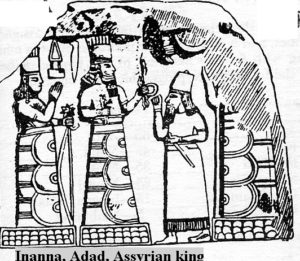
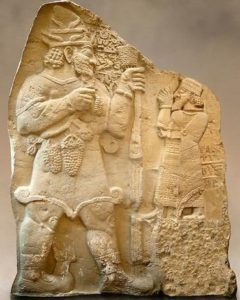 (ALIEN GIANTS APPOINTED OFFSPRING MIXED-BREEDS TO KINGSHIPS OVER EARTHLINGS)
(ALIEN GIANTS APPOINTED OFFSPRING MIXED-BREEDS TO KINGSHIPS OVER EARTHLINGS)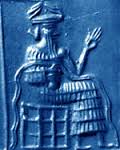
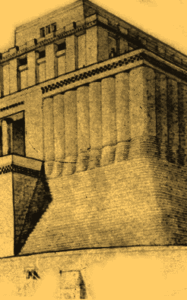 (Enki on his throne; his ziggurat residence located in patron city of Eridu)
(Enki on his throne; his ziggurat residence located in patron city of Eridu)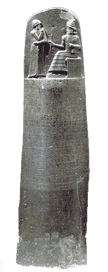
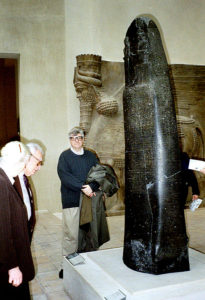
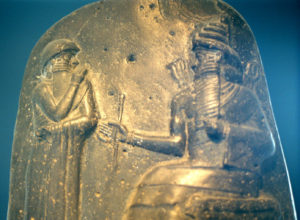 (Babylonian King Hammurabi in “priestly headdress” receives the “Law Code of Hammurabi” from alien giant gods; Hammurabi attentively standing before Utu, giant god of laws)
(Babylonian King Hammurabi in “priestly headdress” receives the “Law Code of Hammurabi” from alien giant gods; Hammurabi attentively standing before Utu, giant god of laws)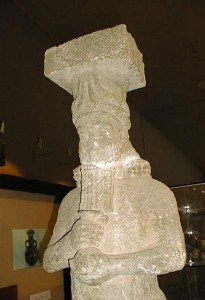 (ENKI; ARTIFACT NOW SHAMEFULLY DESTROYED BY RADICAL ISLAM, FEARING THE ANCIENT KNOWLEDGE)
(ENKI; ARTIFACT NOW SHAMEFULLY DESTROYED BY RADICAL ISLAM, FEARING THE ANCIENT KNOWLEDGE)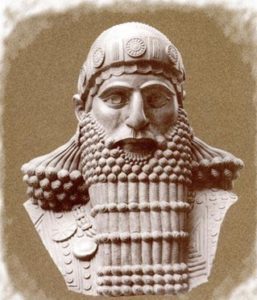 (IN “PRIESTLY HEADDRESS”, FAMOUS BABYLONIAN KING HAMMURABI, SERVANT OF THE GODS)
(IN “PRIESTLY HEADDRESS”, FAMOUS BABYLONIAN KING HAMMURABI, SERVANT OF THE GODS)